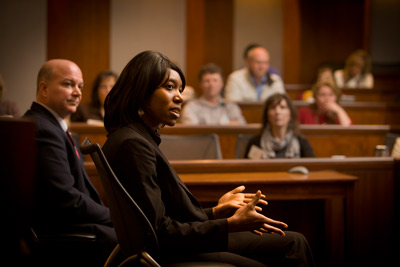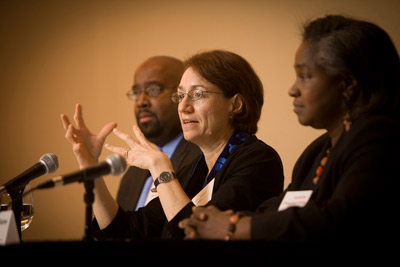Conference addresses ways to create, support greater higher ed diversity
By Susan Kelley


The very best faculty and staff members are more likely to stay at universities with strategic plans and programs that support diversity, according to panelists who spoke at a Cornell diversity conference Nov. 14.
"The future faculty expect equity," said Hazel Sive, associate dean of the School of Science at the Massachusetts Institute of Technology, during the keynote panel discussion of the 13th annual Cornell University Diversity Update Conference at the Statler Hotel.
"Simply put, the very best will be more diverse," said Mary Opperman, Cornell vice president for human resources and safety services, during opening remarks. "We must address the issues that impede the creation of an inclusive environment if we hope to get and keep the very best ... because excellence depends on it."
The conference drew 160 participants who attended sessions on such topics as the workplace stressors faced by diverse faculty and staff; how to attract and retain women in science and engineering; best practices for lesbian, gay, bisexual and transgender (LGBT) diversity; recruitment of diverse staff and faculty; work/life issues; disability access issues; and how to measure diversity program effectiveness.
Speakers came from organizations including Cornell, the National Science Foundation, JP Morgan Chase, Ithaca College, WFD Consulting and the Academic Network Inc. Cornell speakers included Wendy Tarlow, associate university counsel; Matt Carcella, associate dean and director of the LGBT Resource Center; and LaWanda Cook, extension associate from the Employment and Disability Institute. Cornell Interactive Theatre Ensemble performed during two sessions.
Colleges and universities can increase the number of women in science and engineering by making a professor's bid for tenure dependent only on her scholarship, not how long it took -- thus removing the penalty for child rearing that female candidates often face, Sive said. Universities must also look carefully for gender bias in faculty candidates' letters of recommendation. And they must establish actions that can be taken in cases of gender harassment -- for example, if a student is told that she was admitted because she is a woman, Sive said.
Women in science and engineering also need mentors to build their confidence, she said. "If you're worrying about how you're doing, what do people think of me, am I good enough, can I do mathematics, you've taken away the chunk of brain and put it in the 'worry' box and taken it away from the 'get things done' box," she said.
Universities will also retain veterans, individuals with disabilities and those in Generations X and Y with targeted approaches, said Lynette Chappell-Williams, Cornell's associate vice president for inclusion and workforce diversity, during the panel discussion. People with disabilities are more likely to stay with organizations that offer employee resource groups, she said, which not only offer them a support network but also helps the organization identify "best practices" to support those employees. Organizations also need to translate veterans' leadership and teamwork skills into the civilian workplace, and do more outreach to identify veteran candidates, she said. And members of Generations X and Y are more likely to accept employment with organizations that offer a flexible workplace and opportunities for professional development, she said.
Cornell is revamping its University Diversity Council (UDC) to enhance the university's diversity efforts, said Provost Kent Fuchs during the conference's closing remarks.
The UDC is discussing a proposal to ask each vice president and dean to create a measurable diversity goal for their organization, choose four other measureable goals from a "menu" of options, and report progress publicly, Fuchs said. He expects that those goals will filter into each department and unit on campus, he added.
The administration is focused on "celebrating on each other's success, not being afraid to fail, and being accountable in a very public, positive way," he said. "It's all of us working together ... in a way that helps our students, our faculty, our staff and the people of this institution to be better and more diverse."
Media Contact
Get Cornell news delivered right to your inbox.
Subscribe